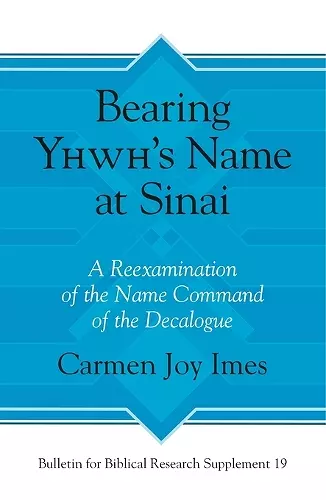Bearing Yhwh’s Name at Sinai
A Reexamination of the Name Command of the Decalogue
Format:Hardback
Publisher:Pennsylvania State University Press
Published:19th Mar '18
Currently unavailable, and unfortunately no date known when it will be back

The Name Command (NC) is usually interpreted as a prohibition against speaking Yhwh’s name in a particular context: false oaths, wrongful pronunciation, irreverent worship, magical practices, cursing, false teaching, and the like. However, the NC lacks the contextual specification needed to support the command as speech related. Taking seriously the narrative context at Sinai and the closest lexical parallels, a different picture emerges—one animated by concrete rituals and their associated metaphorical concepts. The unique phrase ns' shm is one of several expressions arising from the conceptual metaphor, election as branding, that finds analogies in high-priest regalia as well as in various ways of claiming ownership in the Ancient Near East, such as inscribed monuments, the use of seals, and the branding of slaves. The NC presupposes that Yhwh has claimed Israel by placing Yhwh’s own name on her. In this light, the first two commands of the Decalogue reinforce the two sides of the covenant declaration: “I will be your God; you will be my people.” The first expresses the demand for exclusive worship and the second calls for proper representation. As a consequence, the NC invites a richer exploration of what it means to be a people in covenant with Yhwh—a people bearing his name among the nations. It also points to what is at stake when Israel carries that name “in vain.” The image of bearing Yhwh’s name offers a rich source for theological and ethical reflection that cannot be conveyed nonmetaphorically without distortion or loss of meaning.
“Many will benefit from Imes’ judicious work here, especially those with interests in the Decalogue and in the character and role of ancient Israel in its world. Contemporary religious leaders may find the final chapter especially meaningful for their work. In the end, many will find reward in their patient reading of this book and, whether persuaded or not, will nevertheless agree that Imes has put forward a compelling case for a nonelliptical or representational understanding of the name command.”
—Mark W. Bartusch Review of Biblical Literature
“This book is a testimony to the continued value of traditional close-reading strategies and to their renewal through appeal to more recent, cognitively-informed approaches to literary figures.”
—Jeremy M. Hutton Journal of Semitic Studies
“The interpretation of the [Name Command] that emerges from Imes’s study can certainly be very useful to those who pursue a synchronic reading of the [Name Command], insofar as it offers not only a rich theological interpretation relating to the election of the people and its mission of representing yhwh but also important ethical consequences to be kept in high regard.”
—Francesco Cocco Vetus Testamentum
ISBN: 9781575067728
Dimensions: 229mm x 152mm x 19mm
Weight: 499g
248 pages